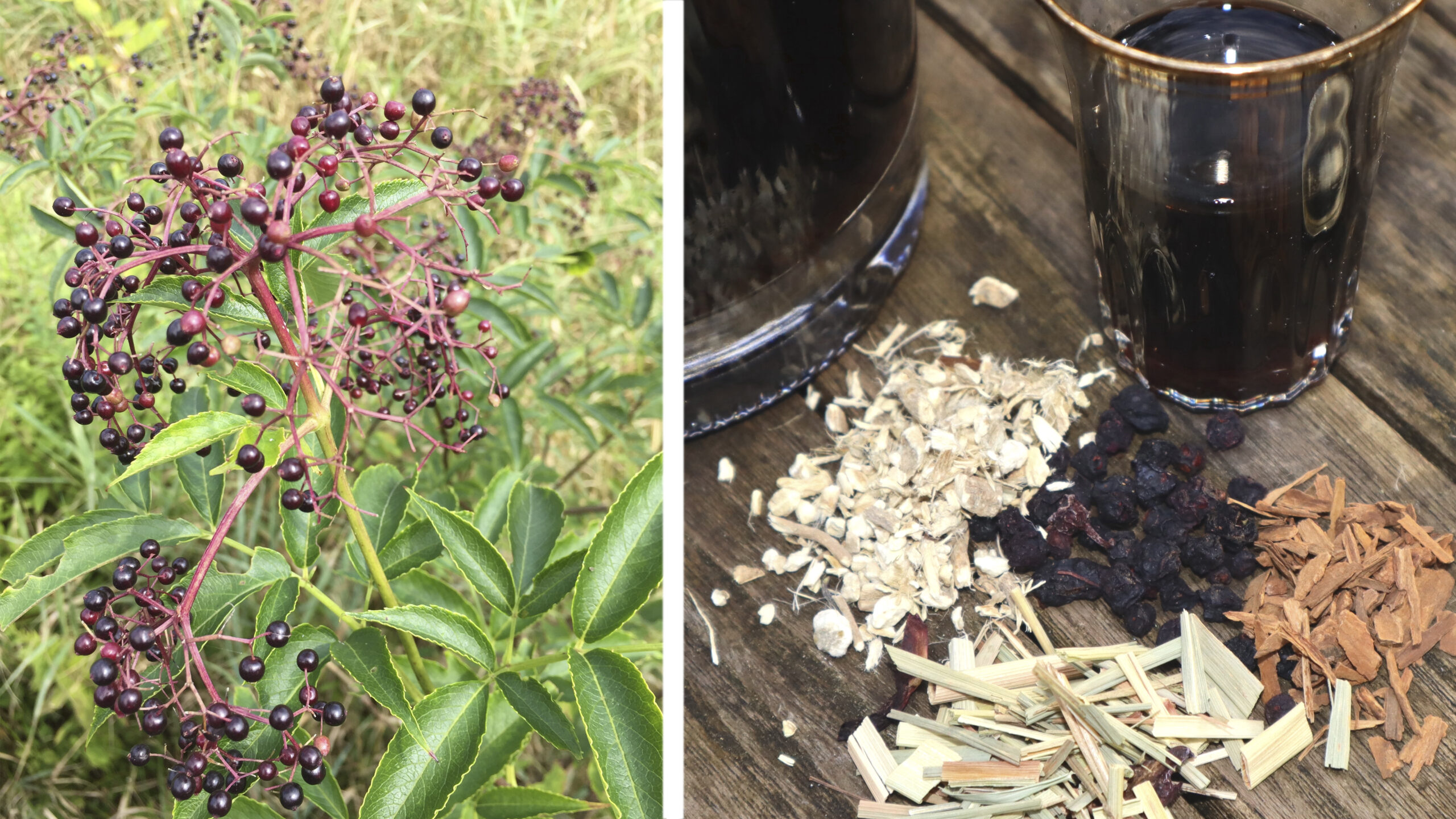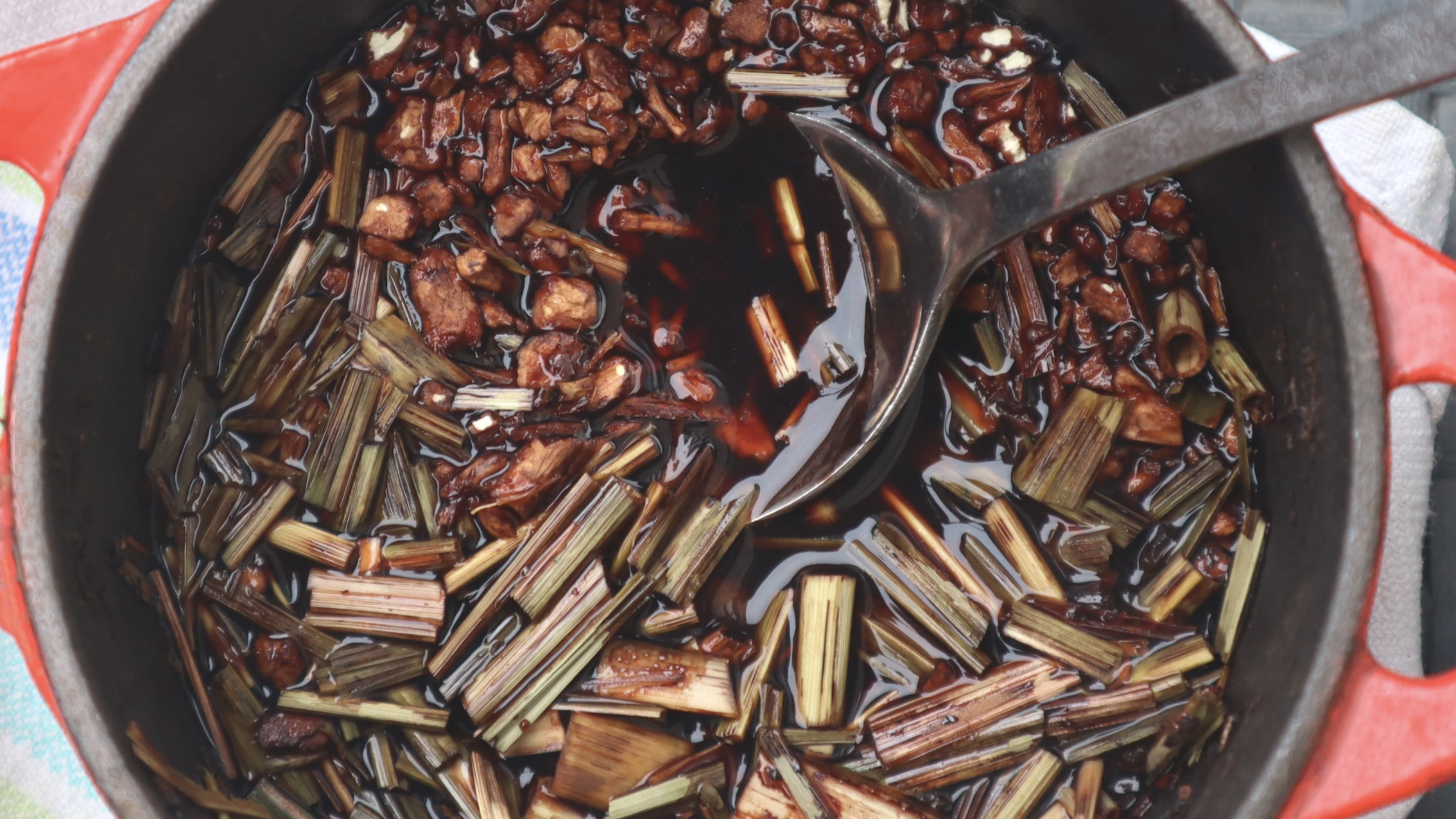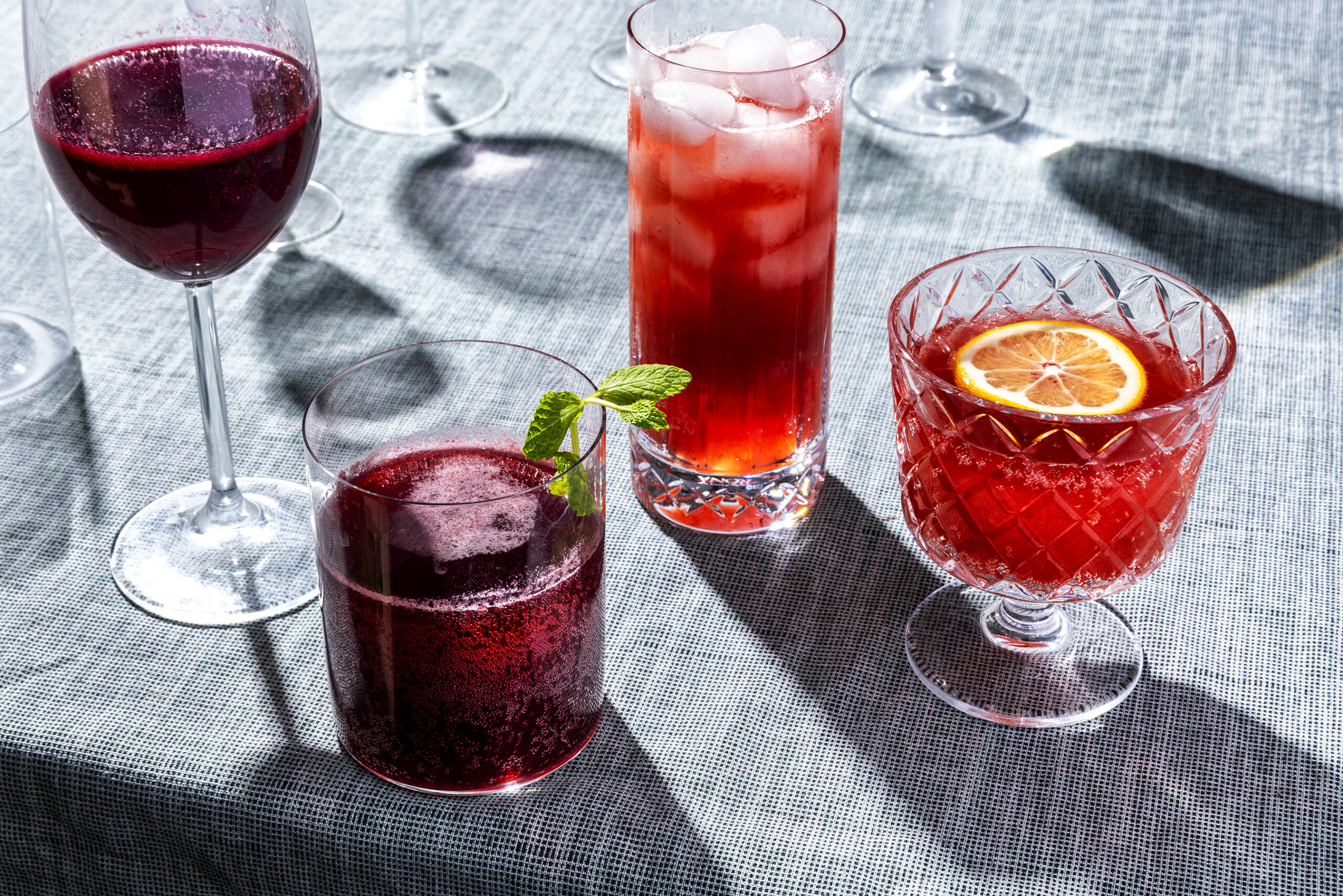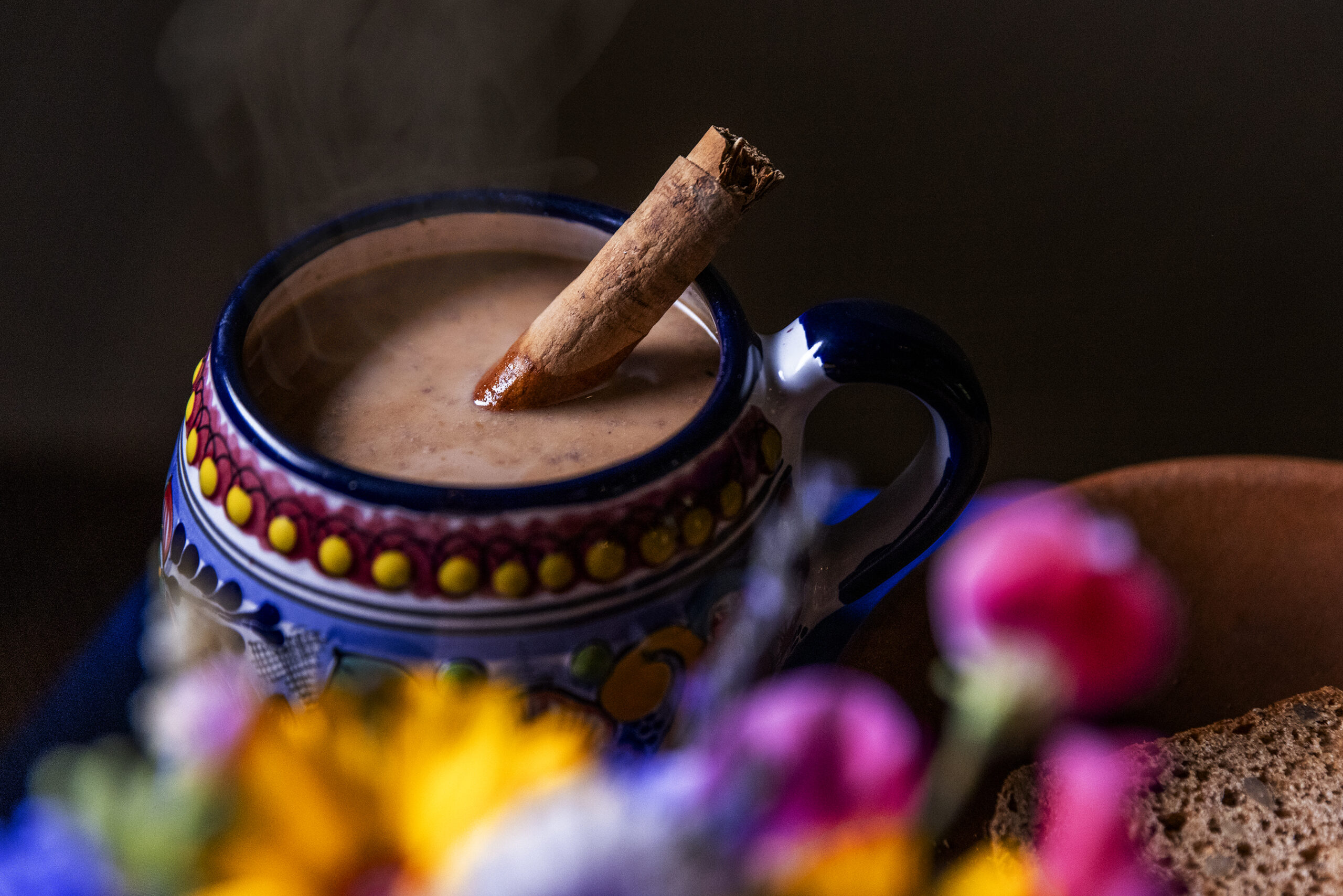Herbal Immune Support Recipe

Scan the shelves at your local health food store, and you will see that one herb, in particular, has a lot of real estate in the cold and flu aisle. You’ll find this specific herb in supplements, sugar syrups, lozenges, and even gummies. Which herb has jostled its way to the prime position? It’s the elderberry. Herbal Immune supporting recipe at the bottom.
What’s so special?
The elder plant, Sambucus, has been referred to as nature’s medicine chest, [i] and with good reason. This purple powerhouse has almost three times the antioxidants as blueberries[ii], and high levels of quercetin and rutin, the flavonoids that support upper respiratory health. The antiviral benefits of elderberry have been shown to effectively treat colds, influenza, and bronchitis [iii]. Herbalists reach for anything elderberry at the first sign of a throat tickle or unwanted sniffle. Studies show that even if your symptoms take hold, some form of this herb will reduce active influenza by up to four days[iv].
Sambucus Canadensis is a species native to North America, and the one most commonly used for medicine in the USA. It can be found growing as far west as Arizona.[v]. The raw berries are irritating to the gut, so if you do happen to find some fresh berries in the farmer’s market next Fall, know that they need cooking before ingesting.
Making your remedy
One of the most traditional and delicious ways to consume elderberry is in a honey and vinegar preparation, known as an oxymel. Despite the fancy word, herbal oxymels are easy to make and have a history that dates back over 2000 years. The best part about making your own elderberry remedy is that you can add other herbs to enhance the benefits of the berries.
The recipe that follows has a generous amount of elderberries and three additional herbs:
Marshmallow root, Althea Officinalis, is soothing to inflamed tissue, anti-inflammatory, and an expectorant. If you have a dry cough, marshmallow root is just what you need. [vi]
Cinnamon, Cinnamomum is anti-inflammatory, antiviral, and antimicrobial and also makes the final oxymel extra delicious with its spice and sweetness. [vii]
Lemongrass, Cymbopogon Citratus, is anti-inflammatory, a decongestant, an expectorant, and a bronchodilator (expands the lungs, making it easier to breathe). [viii]
Herbal Oxymel Recipe
Makes approximately 12oz of oxymel
20 grams Elderberries
5 grams Cinnamon bark
9 ounces of filtered water
8g Marshmallow Root
3g Lemongrass
4 liquid oz of raw honey
4 liquid oz raw apple cider vinegar
Method
- Add the elderberries, cinnamon bark, and water to a cooking pot with a tight-fitting lid.
- Notice the water level before turning on the heat and simmer over low heat for 30 minutes. If there is any evaporation, add a spoonful or two of water as needed.
- Remove from heat and stir in the marshmallow root and lemongrass.
- Allow the herbs to steep for 4 hours. Strain the herbs through a damp muslin cloth, and with clean hands, squeeze out all the concentrated liquid. You should end up with about 1/2 cup of liquid.
- At this point, all you need to do is stir in the honey and vinegar until the honey is thoroughly blended. Then carefully pour the oxymel into a glass storage bottle and keep it in the fridge for up to 2 months.
- Since there is still some vibrancy in the leftover herbs, before adding them to the compost, I usually add 16oz hot water to the strained mix for a further short steep, before straining out the herbs one last time, and drinking the tea.
To use the oxymel, you can take it by the tablespoon or add a splash to some warm water and drink. 1-3 tablespoons/ day.
You can purchase the herbs at your local herb shop or online at Starwest Botanicals, Mountain Rose Herbs, or Jeans Greens.
Note:
- Always check for contraindications with any prescription medications or medical conditions that you have.
- If you have sensitivities to inulin, avoid ginger, dandelion, and burdock.
Dawn Petter is a clinical herbalist and flower essence practitioner in New York City. She is a graduate of Arbor Vitae School of Traditional Herbalism and is trained as a flower essence practitioner with Delta Gardens and Findhorn Essences. Dawn offers in-depth consults by appointment virtually or in-person and teaches classes and retreats at corporations and institutions including, the NY and Brooklyn Botanic Gardens and The NY Open Center, to name a few. She is also the owner of Petalune Herbals, which specializes in small-batch herbal skincare. Her classes are imaginative, accessible, and encourage students to use herbal medicine in everyday life. Visit www.petaluneherbals.com to learn more.
**Disclaimer:
The information provided is for educational purposes only. None of the statements on this page have been evaluated by the Food and Drug Administration, and this information is not intended to diagnose, treat, cure or prevent any disease. If you believe you have a medical condition, please consult your physician.
[i] Balch, Phyllis A. Prescription for Nutritional Healing, 5th ed. Avery, 2002
[ii] Sidor, Andrzej, and Anna Gramza-Michałowska. “Advanced Research on the Antioxidant and Health Benefit of Elderberry (Sambucus Nigra) in Food – a Review.” Journal of Functional Foods, vol. 18, Oct. 2015, pp. 941–958, www.sciencedirect.com/science/article/pii/S1756464614002400, 10.1016/j.jff.2014.07.012. Accessed 4 Aug. 2019
[iii] Sidor, Andrzej, and Anna Gramza-Michałowska. “Advanced Research on the Antioxidant and Health Benefit of Elderberry (Sambucus Nigra) in Food – a Review.” Journal of Functional Foods, vol. 18, Oct. 2015, pp. 941–958, www.sciencedirect.com/science/article/pii/S1756464614002400, 10.1016/j.jff.2014.07.012. Accessed 4 Aug. 2019
[iv] Z, Zakay-Rones, et al. “Randomized Study of the Efficacy and Safety of Oral Elderberry Extract in the Treatment of Influenza a and B Virus Infections.” The Journal of International Medical Research, 1 Mar. 2004, pubmed.ncbi.nlm.nih.gov/15080016/.
[v] “Elder Monograph.” HerbRally, www.herbrally.com/monographs/elder.
[vi] Mcintyre A, Boudin M. Dispensing with Tradition : A Practitioner’s Guide to Using Indian and Western Herbs the Ayurvedic Way. Anne Mcintyre And Michelle Boudin; 2012.
[vii] Mcintyre A, Boudin M. Dispensing with Tradition : A Practitioner’s Guide to Using Indian and Western Herbs the Ayurvedic Way. Anne Mcintyre And Michelle Boudin; 2012.
[viii] Mcintyre A, Boudin M. Dispensing with Tradition : A Practitioner’s Guide to Using Indian and Western Herbs the Ayurvedic Way. Anne Mcintyre And Michelle Boudin; 2012.
See more Holistic Healing presenters and see more healthy recipes.



